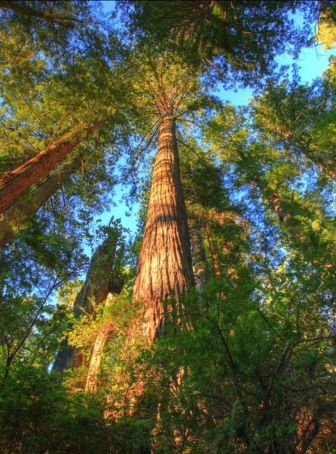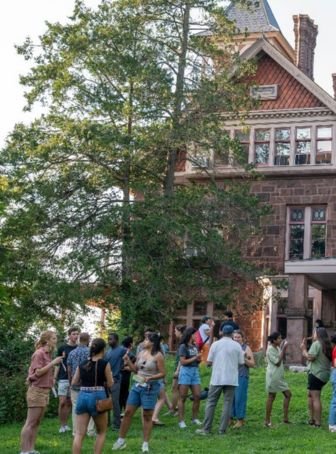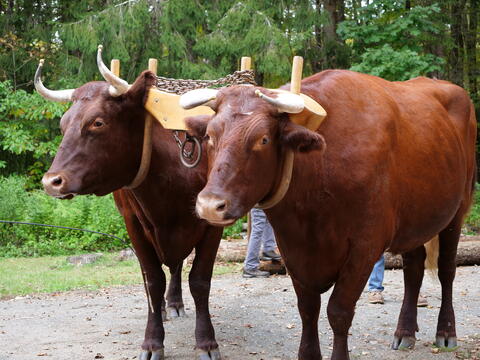By Sara Santiago ’19 MF, Forest Fellow
It is with great pride that we announce Liza Comita and Craig Brodersen have earned tenure! As the next generation of forestry professors, Comita and Brodersen are core faculty members of The Forest School at the Yale School of the Environment at the top of their fields, deeply admired by students, and have developed the curious, future-looking Comita and Brodersen labs. We are excited to introduce their contributions below and an interview regarding what tenure means for them.
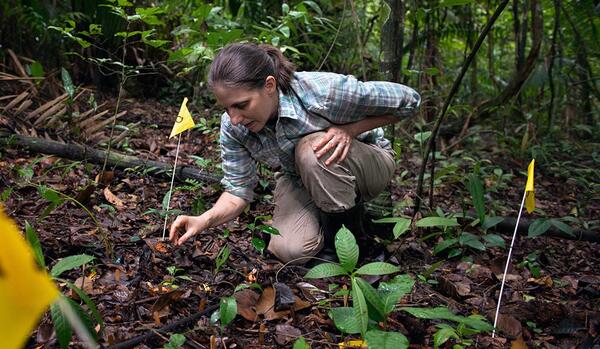
Liza Comita transplants seedlings in a central Panama forest as part of a field experiment examining the effects of drought on tropical tree seedlings. Featured in YaleNews.
As Associate Professor of Tropical Forest Ecology, Comita focuses on the driving patterns of diversity, dynamics, and species distribution. If you have taken one of her courses, such as “Ecology & Conservation of Tropical Forests” or “Tropical Field Ecology,” you are surely familiar with the Janzen-Connell hypothesis. Comita is frequently in the field in Panama’s forests with her lab and Panamanian collaborators. Outside of the forest, she is conducting cutting edge statistics to understand the drivers of tropical forest regeneration and tropical plant communities and their diversity. Comita is a 2019 recipient of NSF’s Faculty Early Development (CAREER) Program, providing her a $620,000 grant to not only conduct research but integrate teaching into her fieldwork. Comita strives to give students the knowledge to make decisions as foresters, policy makers, scientists, researchers, and conservationists. She holds a secondary appointment in Yale’s Department of Ecology & Evolutionary Biology and is a Research Associate at the Smithsonian Tropical Research Institute in Panama.
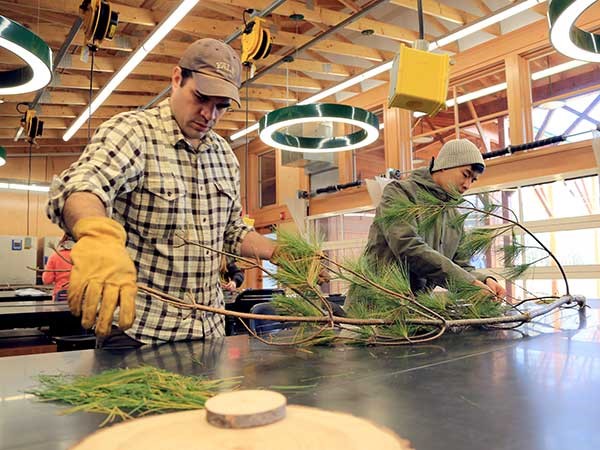
Brodersen (left) works with students at the laboratory at Yale-Myers Forest. Featured in YSE News.
Famous on campus for courses simply and aptly named “Trees,” “Wood,” and “Plant Ecophysiology,” Brodersen, like Comita, effectively captures the minds of undergraduate, graduate, and doctoral students alike. As Associate Professor of Plant Physiological Ecology, Brodersen focuses on structure and function of plants and how plants utilize two of their most limiting resources – water and light. He asks: what does it mean to push plants beyond their physiological thresholds? What dysfunction occurs outside of their optimal conditions? Brodersen and his lab are known for their 3D data portal of hands-on teaching models of plant vascular systems. In support of his research, Brodersen received a $2.5 million gift from The Howard and Maryam Newman Family Plant Research Fund.
Q&A with Liza Comita (LC) and Craig Brodersen (CB):
What does achieving tenure mean for you?
-LC: Achieving tenure means I can take the time to sit back and think about larger projects I’d like to pursue and new research areas I’d like to explore.
-CB: I started my career as a professional scientist 18 years ago at Wake Forest University where I worked on my Master’s research. During that time, I’ve had the opportunity and privilege to work with many talented and insightful people, and I think of getting tenure at Yale not only as a personal achievement, but also one that reflects the collective effort of everyone I’ve worked with along the way. It is also a recognition by my peers and colleagues here at YSE and Yale that the research our group is doing is valued and pushing the field in new directions. Finally, it also reflects the incredibly talented and dedicated staff here at YSE that work to support our research and teaching efforts.
What are you excited about in your scholarship, field work, and research to come? Is there something we wouldn’t know about?
-LC: I’m currently working with collaborators to try to get funding for a new project in Panama to look at the role of plant pathogens in influencing patterns of tropical forest succession. Most studies of forest succession focus on how changes in abiotic conditions, such as light availability, influence the recruitment of different tree species over time. However, we know that plant-pathogen interactions play an important role in structuring tree communities in mature tropical forests, and it is likely that these interactions shift over time during succession and play a role in determining recruitment success of different tree species.
-CB: I’m fortunate to have an amazing group of young scientists in the lab that are engaging in a wide array of projects, and I’m looking forward to collaborating on those going forward. I also have a number of ongoing research collaborations, including the recent gift from the Howard and Maryam Newman Family Plant Research Fund that establishes a new partnership with researchers at the Salk Institute’s Harnessing Plants Initiative. Directing our efforts over the next five years on applied research with the goal of improving photosynthesis in plants is very exciting.
Undergraduate, master, and doctoral students alike highly anticipate your courses, and you are deeply admired by students as both scientists and mentors. What is the importance and value you see in working with students and placing emphasis on teaching and collaboration?
-LC: I work with students conducting research on a variety of topics and at various forest sites around the world. This means that I am exposed to new ideas and new forest systems, which helps broaden my perspective. Similarly, through teaching I discover new studies and new ideas as I search for the latest research to include in my lecture materials and in class discussions. My interactions with students as a mentor and teacher therefore help keep me from becoming too narrowly focused on a single topic.
-CB: One of the best things about YSE is being able to participate in teaching the Master’s program curriculum, where our students bring an exceptional range of backgrounds and interests into the classroom. Finding ways to help those students better understand how the fundamental components and processes taking place inside plant cells scale up to influence processes occurring at the forest or ecosystem level is always rewarding. Teaching courses within YSE and the EVST major for Yale College forces me to take a step back from the focused world of academic research and think more broadly about how to communicate complex topics to a broad audience, and that helps me to better understand the context and implications of the work we do in the lab.
How do you see yourself as a part of The Forest School at YSE outside of your research, which has been central to being named a tenured professor?
-LC: The Forest School provides a vibrant community for all of us in YSE (and beyond) who are interested in understanding, conserving, and managing forests. I am looking forward to seeing how the school’s mission and vision take shape in the coming months and years.
-CB: There has been a long history of faculty within our School with applied and fundamental plant biology research interests. Being provided with the opportunity to carry on that legacy is a tremendous honor. With the formation of The Forest School within YSE I plan on helping to guide the new directions it will take. Having faculty involved with research interests and perspectives from multiple levels of biological organization will be critical in providing a cohesive vision for The Forest School.
Congratulations, Liza and Craig!
